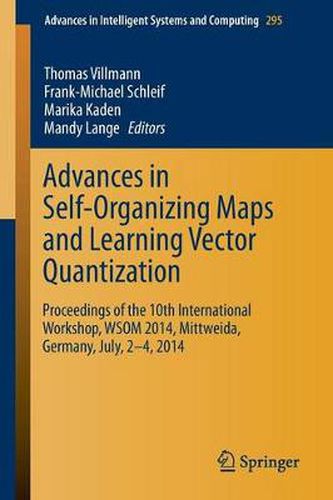Advances in Self-Organizing Maps and Learning Vector Quantization: Proceedings of the 10th International Workshop, WSOM 2014, Mittweida, Germany, July, 2-4, 2014

Advances in Self-Organizing Maps and Learning Vector Quantization: Proceedings of the 10th International Workshop, WSOM 2014, Mittweida, Germany, July, 2-4, 2014
This title is printed to order. This book may have been self-published. If so, we cannot guarantee the quality of the content. In the main most books will have gone through the editing process however some may not. We therefore suggest that you be aware of this before ordering this book. If in doubt check either the author or publisher’s details as we are unable to accept any returns unless they are faulty. Please contact us if you have any questions.
The book collects the scientific contributions presented at the 10th Workshop on Self-Organizing Maps (WSOM 2014) held at the University of Applied Sciences Mittweida, Mittweida (Germany, Saxony), on July 2-4, 2014. Starting with the first WSOM-workshop 1997 in Helsinki this workshop focuses on newest results in the field of supervised and unsupervised vector quantization like self-organizing maps for data mining and data classification.
This 10th WSOM brought together more than 50 researchers, experts and practitioners in the beautiful small town Mittweida in Saxony (Germany) nearby the mountains Erzgebirge to discuss new developments in the field of unsupervised self-organizing vector quantization systems and learning vector quantization approaches for classification. The book contains the accepted papers of the workshop after a careful review process as well as summaries of the invited talks. Among these book chapters there are excellent examples of the use of self-organizing maps in agriculture, computer science, data visualization, health systems, economics, engineering, social sciences, text and image analysis and time series analysis. Other chapters present the latest theoretical work on self-organizing maps as well as learning vector quantization methods, such as relating those methods to classical statistical decision methods.
All the contribution demonstrate that vector quantization methods cover a large range of application areas including data visualization of high-dimensional complex data, advanced decision making and classification or data clustering and data compression.
This item is not currently in-stock. It can be ordered online and is expected to ship in 7-14 days
Our stock data is updated periodically, and availability may change throughout the day for in-demand items. Please call the relevant shop for the most current stock information. Prices are subject to change without notice.
Sign in or become a Readings Member to add this title to a wishlist.


